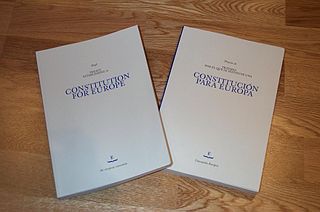Related Research Articles

A treaty is a formal, legally binding written agreement concluded by sovereign states in international law. International organizations can also be party to an international treaty. A treaty is binding under international law.

The European Communities Act 1972, also known as the ECA 1972, was an act of the Parliament of the United Kingdom which made legal provision for the accession of the United Kingdom as a member state to the three European Communities (EC) – the European Economic Community, European Atomic Energy Community (Euratom), and the European Coal and Steel Community ; the EEC and ECSC subsequently became the European Union.

English law is the common law legal system of England and Wales, comprising mainly criminal law and civil law, each branch having its own courts and procedures.

The law of the Republic of Ireland consists of constitutional, statutory, and common law. The highest law in the State is the Constitution of Ireland, from which all other law derives its authority. The Republic has a common-law legal system with a written constitution that provides for a parliamentary democracy similar to the British parliamentary system, albeit with a popularly elected president, a separation of powers, a developed system of constitutional rights and judicial review of primary legislation.

The Treaty establishing a Constitution for Europe was an unratified international treaty intended to create a consolidated constitution for the European Union (EU). It would have replaced the existing European Union treaties with a single text, given legal force to the Charter of Fundamental Rights, and expanded qualified majority voting into policy areas which had previously been decided by unanimity among member states.
A constitutional amendment is a modification of the constitution of a polity, organization or other type of entity. Amendments are often interwoven into the relevant sections of an existing constitution, directly altering the text. Conversely, they can be appended to the constitution as supplemental additions, thus changing the frame of government without altering the existing text of the document.

The Vienna Convention on the Law of Treaties (VCLT) is an international agreement that regulates treaties among sovereign states.
Ratification is a principal's legal confirmation of an act of its agent. In international law, ratification is the process by which a state declares its consent to be bound to a treaty. In the case of bilateral treaties, ratification is usually accomplished by exchanging the requisite instruments, and in the case of multilateral treaties, the usual procedure is for the depositary to collect the ratifications of all states, keeping all parties informed of the situation.

The primary and fundamental statement of laws in the Russian Federation is the Constitution of the Russian Federation. Statutes, like the Russian Civil Code and the Russian Criminal Code, are the predominant legal source of Russian laws.
In law, coming into force or entry into force is the process by which legislation, regulations, treaties and other legal instruments come to have legal force and effect. The term is closely related to the date of this transition. The point at which such instrument comes into effect may be set out in the instrument itself, or after the lapse of a certain period, or upon the happening of a certain event, such as a proclamation or an objective event, such as the birth, marriage, reaching a particular age or death of a certain person. On rare occasions, the effective date of a law may be backdated to a date before the enactment.

The United States is not a state party to the Rome Statute of the International Criminal Court, which founded the International Criminal Court (ICC) in 2002.
Sources of law are the origins of laws, the binding rules that enable any state to govern its territory. The terminology was already used in Rome by Cicero as a metaphor referring to the "fountain" of law. Technically, anything that can create, change, or cancel any right or law is considered a source of law.
The terms monism and dualism are used to describe two different theories of the relationship between international law and domestic law. Monism and dualism both offer approaches to how international law comes into effect within states, and how conflicts between national and international law are resolved. In practice, many states are partly monist and partly dualist in their actual application of international law in their national systems.

The primacy of European Union law is a legal principle establishing precedence of European Union law over conflicting national laws of EU member states.
The Treaty Clause of the United States Constitution establishes the procedure for ratifying international agreements. It empowers the President as the primary negotiator of agreements between the United States and other countries, and holds that the advice and consent of a two-thirds supermajority of the Senate renders a treaty binding with the force of federal law.
Medellín v. Texas, 552 U.S. 491 (2008), was a decision of the United States Supreme Court that held even when a treaty constitutes an international commitment, it is not binding domestic law unless it has been implemented by an act of the U.S. Congress or contains language expressing that it is "self-executing" upon ratification. The Court also ruled that decisions of the International Court of Justice are not binding upon the U.S. and, like treaties, cannot be enforced by the president without authority from Congress or the U.S. Constitution.

The Treaty of Lisbon is an international agreement that amends the two treaties which form the constitutional basis of the European Union (EU). The Treaty of Lisbon, which was signed by all EU member states on 13 December 2007, entered into force on 1 December 2009. It amends the Maastricht Treaty (1992), known in updated form as the Treaty on European Union (2007) or TEU, as well as the Treaty of Rome (1957), known in updated form as the Treaty on the Functioning of the European Union (2007) or TFEU. It also amends the attached treaty protocols as well as the Treaty establishing the European Atomic Energy Community (EURATOM).
The Supremacy Clause of the Constitution of the United States establishes that the Constitution, federal laws made pursuant to it, and treaties made under its authority, constitute the "supreme Law of the Land", and thus take priority over any conflicting state laws. It provides that state courts are bound by, and state constitutions subordinate to, the supreme law. However, federal statutes and treaties must be within the parameters of the Constitution; that is, they must be pursuant to the federal government's enumerated powers, and not violate other constitutional limits on federal power, such as the Bill of Rights—of particular interest is the Tenth Amendment to the United States Constitution, which states that the federal government has only those powers that are delegated to it by the Constitution. It is the responsibility of the United States Supreme Court in that case to exercise the power of judicial review: the ability to invalidate a statute for violating a provision of the Constitution.

The Treaties of the European Union are a set of international treaties between the European Union (EU) member states which sets out the EU's constitutional basis. They establish the various EU institutions together with their remit, procedures and objectives. The EU can only act within the competences granted to it through these treaties and amendment to the treaties requires the agreement and ratification of every single signatory.
Primary legislation and secondary legislation are two forms of law, created respectively by the legislative and executive branches of governments in representative democracies. Primary legislation generally consists of statutes, also known as 'acts', that set out broad principles and rules, but may delegate specific authority to an executive branch to make more specific laws under the aegis of the principal act. The executive branch can then issue secondary legislation, creating legally enforceable regulations and the procedures for implementing them.
References
- ↑ "Irish Treaty Practice". Irish Department for Foreign Affairs. Retrieved 3 September 2008.
- ↑ "EU Law: Glossary". Oxford University Press. Retrieved 3 September 2008.
When a dualist state signs a treaty, the treaty becomes binding only if it is incorporated by a domestic statute.
- ↑ Aust, Anthony (2000). Modern Treaty Law and Practice . Cambridge University Press. p. 147.
- ↑ Romano, Cesare (23 August 2006). "A quick ABC of international law" . Retrieved 4 September 2008.
- ↑ Art. 55, French Constitution of 4 October 1958. Archived 15 May 2012 at the Wayback Machine
- ↑ Art. 52, French Constitution of 4 October 1958. Archived 15 May 2012 at the Wayback Machine
- ↑ Treaties and other International Agreements: the Role of the United States Senate (Congressional Research Service 2001).